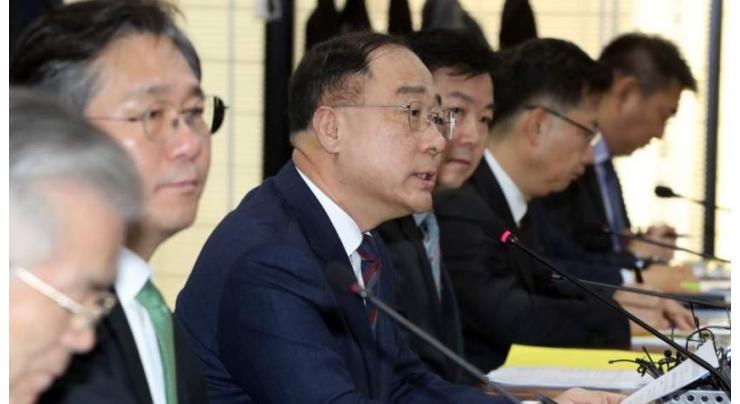
S. Korea To Increase Hydrogen-powered Vehicles To 80,000 Units By 2022
Mohammad Ali (@ChaudhryMAli88) Published January 16, 2019 | 06:07 PM

South Korea's finance minister said Wednesday that the government will increase the number of hydrogen fuel cell electric vehicles to about 80,000 units by 2022 as part of a broader effort to give a boost to the "hydrogen economy."
Finance Minister Hong Nam-ki speaks at an innovative growth strategy meeting in southern Seoul on Jan. 16, 2019. (Yonhap) (LEAD) S. Korea to increase hydrogen-powered vehicles to 80,000 units by 2022.
In 2018, about 2,000 hydrogen fuel cell electric vehicles were in operation in South Korea, home to Hyundai Motor Co., the world's first mass-producer of hydrogen fuel cell electric vehicles (FCEVs).
Hong said South Korea has come up with a strategy to cover a wide range of hydrogen economy issues such as production, storage, transport and utilization of hydrogen to dominate global markets.
He did not give any further details on hydrogen charging stations, a key element of the infrastructure needed to boost the number of zero-emission FCEVs.
Currently, there are only 15 charging stations for hydrogen fuel cell electric vehicles across South Korea, including two in Seoul, according to the Ministry of Trade, Industry and Energy.
South Korea plans to set up 71 additional charging stations this year before boosting the number to 310 by 2022, the ministry said.
Driving a hydrogen fuel cell electric vehicle costs 8,300 won (US$7.4) per 100 kilometers, compared with 11,600 won for gasoline.
On Thursday, South Korea is set to make an announcement on its strategy in a meeting to be presided over by President Moon Jae-in.
South Korea views the hydrogen economy as a new growth engine for its economy, which has relied heavily on semiconductors for decades.
Chips accounted for 21.2 percent of South Korea's total exports in 2018, compared with 10.9 percent in 2010, according to data compiled by the Institute for International Trade.
Global carmakers have been racing to go eco-friendly amid tightened regulations on emissions of greenhouse gases, which scientists say are to blame for global warming.
A hydrogen fuel cell electric car emits only water vapor as it converts stored hydrogen into electricity to turn the drive motor.
Hyundai has said its Nexo hydrogen fuel cell electric vehicle has an estimated driving range of 609 kilometers (378 miles) on a five-minute fill-up.
Separately, Hong vowed to boost the competitiveness of the manufacturing sector and to ensure new startups and industries face no regulatory obstacles that could hold them back.
Hong made the comments in his first meeting with business community leaders, including top representatives from the Korea Chamber of Commerce and Industry, which speaks on behalf of South Korean businesses.
Related Topics
Recent Stories

Israel carries out attack inside Iran, report US media

Saudi Assistant Minister of Defence calls on army chief

Currency Rate In Pakistan - Dollar, Euro, Pound, Riyal Rates On 19 April 2024

Today Gold Rate in Pakistan 19 April 2024

Rock-solid Ruud racks up season-leading win in Barcelona

At UN, Iran says it will make Israel 'regret' reprisals

G7 hears calls for 'critical' Ukraine aid

EU seeks to leverage might to confront China, US challenge

5 Customs officials martyred as their vehicle ambushed by terrorists in D I Khan

Pak-New Zealand match called off due to rain

NHA restores traffic on roads affected by recent rains in Balochistan

China to fully support Pakistan's efforts against terrorism: Ambassador Jiang
More Stories From Business
-
Japanese auto giant Nissan cuts sales, profit forecasts
35 seconds ago -
KPT shipping movements report
1 hour ago -
Food exports grew by 48.17% in 09 months, reached $5.651 bln
2 hours ago -
Exchange rates for currency notes
5 hours ago -

Currency Rate In Pakistan - Dollar, Euro, Pound, Riyal Rates On 19 April 2024
5 hours ago -
Foreign exchange rates
5 hours ago
-

Today Gold Rate in Pakistan 19 April 2024
6 hours ago -
Oil jumps more than 3% on Middle East worries
6 hours ago -
Tokyo's Nikkei index tumbles 3% in morning trade
6 hours ago -

Pakistan's total liquid foreign reserves reach $ 13.37 billion
16 hours ago -

Stock markets rise as traders consider US rate outlook
17 hours ago -

Business community alarmed by alleged Cigarette tax violations
17 hours ago










